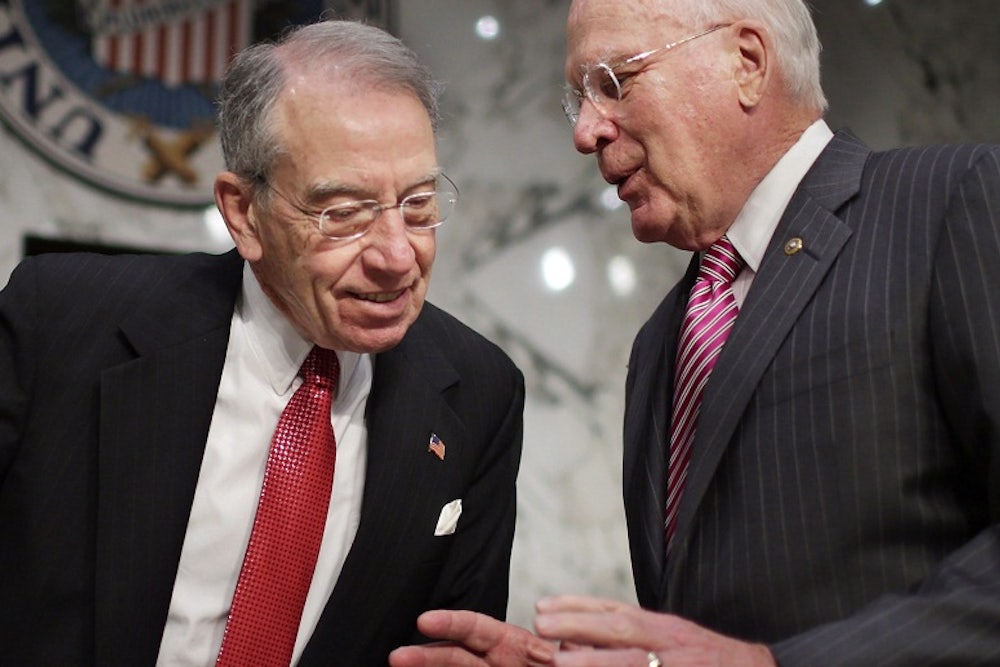Observers of the Senate Judiciary Committee on Monday were treated to the spectacle of two members, Democrat Patrick Leahy of Vermont and Republican Chuck Grassley of Iowa, accusing one another of using the horrific attack on the Boston Marathon to achieve political goals. The previous week, Grassley had declared that the episode would help us “understand the gaps and loopholes in our immigration system,” at a point when even he conceded that the immigration status of the two plotters was undetermined. Leahy, the committee’s chairman, accused Republicans of exploiting the bloodshed to obstruct immigration reform, which eventually led Grassley to repeatedly shout, “I didn’t say that,” at a third committee member, New York Democrat Chuck Schumer. The theatrics generated headlines, as they were intended to do, but provided no insight into the attack, or immigration reform, or why two old colleagues would posture publicly like schoolyard rowdies.
It was inevitable that someone would be vilified for “politicizing” the marathon bombing—the scare quotes are necessary for such a meaningless term, an epithet that career politicians deploy against one another for the crime of seeming political.1 There can be no such thing as “politicizing” such an event, not when its origins and implications concern the public interest that our political system was expressly designed to advance. Virtually all the catastrophes that we deem senseless are, in fact, intrinsically political. Hurricane Katrina may have been an "act of God" to some monotheists and insurance claimants, but the act of appointing the former commissioner of the International Arabian Horse Association to head the nation’s emergency preparedness efforts? Not so much. We may never fully understand why Tamerlan and Dzhokhar Tsarnaev did what they did, but we can, and should, account for as much as we possibly can, including how they came to America—and that's a discussion not just for investigators and the media, but Capitol Hill, too.
Little is novel about the dustup between Grassley, Leahy, and Schumer. All three senators have been in public life for decades and have had ample opportunity to play the role of both controversy-monger and solemn scold. Some of us are even old enough to remember when the spry Grassley of yesteryear criticized his friends in the majority for using the deaths in Newtown “to put forward every gun control measure that has been floating around for years.” The man has held elected office since the Eisenhower presidency—he is surely savvy enough to realize that there is no essential difference between the two cases. Indeed, even while deflecting Leahy’s admonishment, Grassley took exception to the Democrats’ oh-so-political discussion of further regulating fertilizer plants in the aftermath of the deadly explosion in West, Texas. But senator, more than a dozen people are dead. By your own logic, isn’t it fair to ask why?
There is nothing inherently objectionable about using very sad, heavily publicized incidents to instantiate an argument about public policy. It is the height of cynicism, however, to stand atop the bodies of the freshly killed and, without the benefit of proof, perpetuate a claim that is fantastically false. Texas Congressman Louie Gohmert was certainly guilty of this last week when he compared the Mexican border unfavorably with the security wall between Israel and the West Bank, ludicrously announcing that “Al Qaeda has camps over with the drug cartels on the other side of the Mexican border.” Grassley was wrong to speak ominously about the dangers of immigration before the facts were known (both Tsarnaev brothers were legal residents of the United States, Dzhokhar a naturalized citizen while Tamerlan had a green card), but probably deserves a pass; Gohmert, one of the most consistently incendiary House members, actually earned the denunciation his Senate counterpart received.
Democrats should understand the good that can come of forthrightly pegging pieces of legislation to the social ills that precipitated them. It was Rahm Emanuel, after all, who observed that political leaders must never “let a serious crisis go to waste.” Democrats would have done well to heed his advice in the wake of the Newtown atrocities: After the slow death of the Manchin-Toomey background check plan, it is difficult not to wonder whether President Barack Obama and his allies in Congress would have been successful had they proposed new gun laws immediately following the shootings, rather than tarry respectfully for a month while public support dwindled.
They are repeating the mistake presently, chastising Republicans for their lack of tact when they ought to be making inquiries about the guns used by the Tsarnaevs to kill and maim police officers in Massachusetts. Neither brother had a permit to own a weapon, as Massachusetts law requires, and Dzhokhar, at 19, would have been too young to obtain one anyway. So politicize away, Democrats. It may be the only way to get anything done.
It is also one of those odious neologisms, like dialoguing or securitizing, that make a hideous verb out of a perfectly honest noun.
